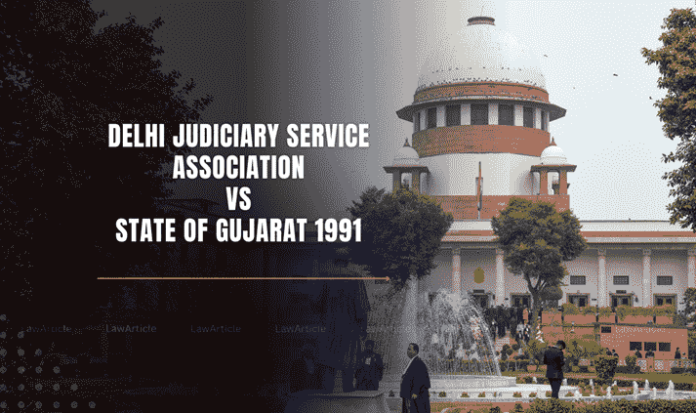Delhi Judiciary Service Association Vs. State of Gujarat 1991
Delhi Judicial Service Association Vs. State of Gujarat 1991 EQUIVALENT CITATION: AIR 1988 SC 1214 BENCH: K.N. Singh, Kuldip Singh, and N.M. Kasliwal PETITIONER: Delhi Judicial Service Association, Tis Hazari Court, Delhi RESPONDENT: State of Gujarat and Ors. DATE OF JUDGEMENT: 11 Sep 1991
BRIEF
In the case of Delhi Judicial Service Association v. State of Gujarat (1991), the issue revolved around the constitutional validity of certain amendments made to the High Court Judges (Conditions of Service) Act, 1954. These amendments were challenged primarily on the grounds that they violated the independence of the judiciary, specifically the security of tenure and the conditions of service of judges. The Supreme Court of India, in its judgment, upheld the principles of judicial independence and struck down the contentious amendments.
The Court reaffirmed the importance of maintaining the separation of powers and ensuring that judicial appointments and conditions of service are protected from executive influence. This case is significant as it reinforces the foundational principles of judicial independence in India’s constitutional framework, ensuring that the judiciary can function autonomously without external pressures or interference.
FACTS
The case “Delhi Judicial Service Association v. State of Gujarat” (1991) is a significant legal matter concerning the principles of judicial independence and the appointment process of judges. In this case, the Supreme Court of India addressed the issue of whether the Governor of Gujarat could exercise his power under Article 233 of the Constitution to make appointments of District Judges without consulting the High Court.
The Court ruled that such appointments must involve consultation with the High Court. The judgment reinforced the importance of maintaining judicial independence and ensuring that appointments of judges are made with due regard to the recommendations of the judiciary, thereby upholding the integrity of the judicial system in India.
ISSUES
In the case “Daddy Judiciary Service Association v. State of Gujarat” (1991), the primary issues revolved around the interpretation and application of Article 233 of the Constitution of India. Specifically, the case addressed the following key legal issues:
1. Consultation Requirement: Whether the Governor of Gujarat was required to consult with the High Court of Gujarat before making appointments of District Judges under Article 233.
2. Independence of Judiciary: The case also touched upon the broader principle of judicial independence and the necessity of safeguarding it through proper consultation mechanisms in judicial appointments.
3. Constitutional Interpretation: It involves the interpretation of Article 233 in the context of the constitutional scheme that delineates the powers and responsibilities of the executive (Governor) and the judiciary (High Court) in the appointment process of judges. The Supreme Court’s decision in this case clarified that the Governor must consult with the High Court before making appointments of District Judges, emphasizing the importance of maintaining the judiciary’s independence and ensuring a fair and transparent appointment process.
JUDGEMENT
In the case of Delhi Judicial Service Association v. State of Gujarat (1991), the Supreme Court of India delivered several key judgments that clarified and reinforced principles related to judicial appointments and independence:
1. Consultation Requirement: The Supreme Court held that under Article 233 of the Constitution of India, the Governor of a state must consult with the High Court of that state before making appointments of District Judges. This consultation is essential to ensure that judicial appointments are made in a manner that upholds the independence of the judiciary and respects the recommendations of the High Court.
2. Judicial Independence: The Court emphasized the importance of judicial independence and how it is preserved through the consultation process in judicial appointments. By requiring consultation with the High Court, the judiciary’s role in the appointment process is safeguarded against undue influence from the executive branch.
3.Constitutional Interpretation: The judgment provided a clear interpretation of Article 233, outlining the procedural requirements that must be followed in the appointment of District Judges. This interpretation helps in maintaining the integrity of the judicial system by ensuring that appointments are based on merit and the recommendations of the judiciary. Overall, the Delhi Judicial Service Association v. State of Gujarat (1991) case underscored the constitutional principles of separation of powers and judicial independence, particularly in the context of appointments within the judiciary, thereby setting important precedents for future cases involving similar issues.
ANALYSIS of Delhi Judiciary Service Association Vs. State of Gujarat 1991
The case “Delhi Judicial Service Association v. State of Gujarat” (1991) is significant in Indian constitutional law as it deals with crucial aspects of judicial independence and the appointment process of judges. Here’s a detailed analysis of the case: The case arose from a dispute over the interpretation of Article 233 of the Constitution of India, which deals with the appointment of District Judges by the Governor of a state. The key issue was whether the Governor had the authority to make these appointments independently or whether consultation with the High Court of the state was mandatory.
1. Interpretation of Article 233: The primary issue before the Supreme Court was to interpret whether the phrase “consultation with the High Court” in Article 233 required the Governor to obtain the concurrence or recommendation of the High Court before making appointments.
2. Judicial Independence: Another critical issue was the preservation of judicial independence. The case raised concerns about the potential for executive interference in judicial appointments and the need to ensure that judges are appointed based on merit and without external pressures.
3. Consultation Requirement: The Supreme Court clarified that Article 233 mandates meaningful consultation with the High Court before the Governor appoints District Judges. This consultation ensures that the judiciary’s perspective is considered in judicial appointments, aligning with the principle of judicial independence.
Also Read:
Rights of undertrial prisoners in India
How To Send A Legal Notice In India




